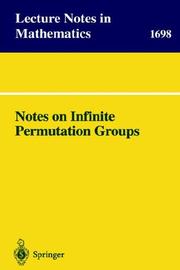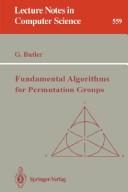| Listing 1 - 2 of 2 |
Sort by
|

ISBN: 3540649654 3540498133 9783540649656 Year: 1998 Volume: 1698 Publisher: Berlin ; Heidelberg ; New York Springer Verlag
Abstract | Keywords | Export | Availability | Bookmark
 Loading...
Loading...Choose an application
- Reference Manager
- EndNote
- RefWorks (Direct export to RefWorks)
The book, based on a course of lectures by the authors at the Indian Institute of Technology, Guwahati, covers aspects of infinite permutation groups theory and some related model-theoretic constructions. There is basic background in both group theory and the necessary model theory, and the following topics are covered: transitivity and primitivity; symmetric groups and general linear groups; wreatch products; automorphism groups of various treelike objects; model-theoretic constructions for building structures with rich automorphism groups, the structure and classification of infinite primitive Jordan groups (surveyed); applications and open problems. With many examples and exercises, the book is intended primarily for a beginning graduate student in group theory.
Permutation groups --- Permutatiegroepen --- Permutation [Groupes de ] --- Group theory. --- Group Theory and Generalizations. --- Groups, Theory of --- Substitutions (Mathematics) --- Algebra

ISBN: 3540549552 0387549552 354046607X Year: 1991 Volume: 559 Publisher: Berlin ; New York, NY : Springer-Verlag,
Abstract | Keywords | Export | Availability | Bookmark
 Loading...
Loading...Choose an application
- Reference Manager
- EndNote
- RefWorks (Direct export to RefWorks)
This is the first-ever book on computational group theory. It provides extensive and up-to-date coverage of the fundamental algorithms for permutation groups with reference to aspects of combinatorial group theory, soluble groups, and p-groups where appropriate. The book begins with a constructive introduction to group theory and algorithms for computing with small groups, followed by a gradual discussion of the basic ideas of Sims for computing with very large permutation groups, and concludes with algorithms that use group homomorphisms, as in the computation of Sylowsubgroups. No background in group theory is assumed. The emphasis is on the details of the data structures and implementation which makes the algorithms effective when applied to realistic problems. The algorithms are developed hand-in-hand with the theoretical and practical justification.All algorithms are clearly described, examples are given, exercises reinforce understanding, and detailed bibliographical remarks explain the history and context of the work. Much of the later material on homomorphisms, Sylow subgroups, and soluble permutation groups is new.
Group theory --- Computer science --- Algorithmes --- Algorithms --- Algoritmen --- Permutatiegroepen --- Permutation [Groupes de ] --- Permutation groups --- Permutation groups. --- Algorithms. --- Groupes de permutations --- 681.3*I12 --- Substitution groups --- Algorism --- Algebra --- Arithmetic --- Algorithms: algebraic algorithms; nonalgebraic algorithms; analysis of algorithms (Algebraic manipulation; computing methodologies) --- Foundations --- 681.3*I12 Algorithms: algebraic algorithms; nonalgebraic algorithms; analysis of algorithms (Algebraic manipulation; computing methodologies) --- Information theory. --- Group theory. --- Computer software. --- Combinatorics. --- Theory of Computation. --- Group Theory and Generalizations. --- Discrete Mathematics. --- Symbolic and Algebraic Manipulation. --- Algorithm Analysis and Problem Complexity. --- Data processing. --- Combinatorics --- Mathematical analysis --- Software, Computer --- Computer systems --- Groups, Theory of --- Substitutions (Mathematics) --- Communication theory --- Communication --- Cybernetics
| Listing 1 - 2 of 2 |
Sort by
|

 Search
Search Feedback
Feedback About
About Help
Help News
News